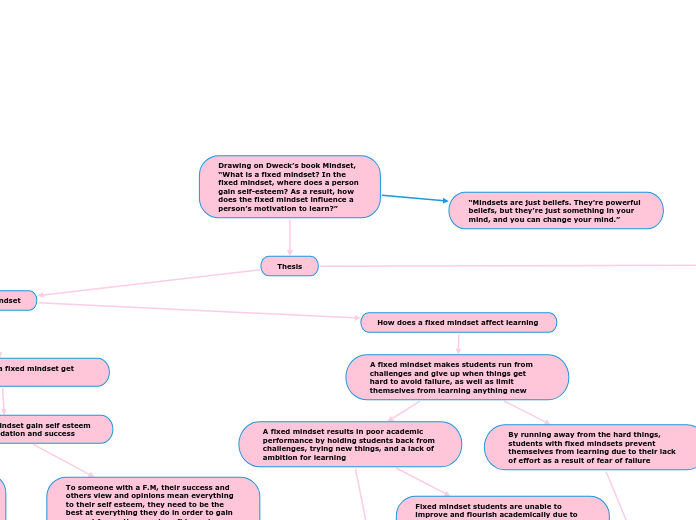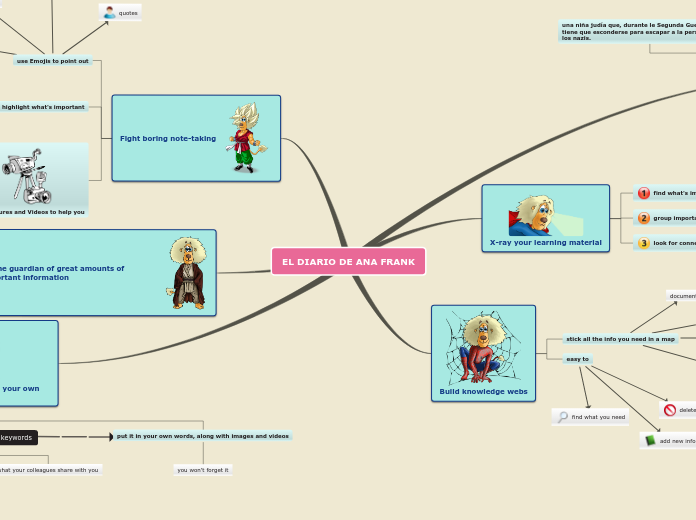Drawing on Dweck’s book Mindset,
“What is a fixed mindset? In the
fixed mindset, where does a person
gain self-esteem? As a result, how
does the fixed mindset influence a
person’s motivation to learn?”
“Mindsets are just beliefs. They’re powerful beliefs, but they’re just something in your mind, and you can change your mind.”
Thesis
Growth Mindset
How does a growth mindset affect learning
Students with a growth mindset view failure as opportunity, accept criticism as a way to improve themselves, and are more likely to not only learn from their mistakes, but grow as well
Criticism is not a threat on a person with a growth mindset’s self worth, but instead helpful critiques that allow themselves to understand the aspects they need to put extra emphasis on in order to succeed
“There were two meanings to ability, not one: a fixed ability that needs to be proven, and a changeable ability that can be developed through learning”
To a student with a growth mindset, failure does not define who they are, and who they allow themselves to become, but rather presents itself as an opportunity to learn and develop from said mistakes and failures
A student with a growth mindset is more keen to face a challenge, learn something new, and accepts failure, allowing themselves to succeed and progress through the want to learn and grow
How does a growth mindset affect self esteem
Through perseverance and effort, those with a growth mindset boost their self esteem by having a desire to learn, grow, and develop despite being faced with challenges, failure, and adversity
Due to their ability to work towards success, rather than instant gratification, they improve their sense of self and ability
“Becoming is better than being.”
By being able to achieve success through hard work and effort, people with a growth mindset experience an increase of their confidence and self esteem
By prioritizing fluency over efficiency, people with growth mindsets earn their success, rather than giving up and taking the easy way out, which leads to a higher boost in their confidence and self esteem
Define a growth mindset
Someone with a growth mindset believes that their abilities and skills are able to be developed through learning, effort, dedication, and hard work. When they are faced with challenges, they persevere and use their failures and struggles as not only motivation, but as a learning experience and an opportunity to succeed.
They believe through effort and hard work that they are not only able to overcome challenges, but are able to completely alter their skills and abilities
“When people believe their basic qualities can be developed, failures may still hurt, but failures don’t define them. And if abilities can be expanded—if change and growth are possible—then there are still many paths to success.”
Through the power of effort and hard work, people with growth mindsets believe that skills such as intelligence, personality, and even their athletic ability are able to be developed and grown, leading to success and fluency in the end.
People with a growth mindset believes their skills such as intelligence, personality, and even athletic ability are able to be developed and changed
Fixed Mindset
How does a fixed mindset affect learning
A fixed mindset makes students run from challenges and give up when things get hard to avoid failure, as well as limit themselves from learning anything new
By running away from the hard things, students with fixed mindsets prevent themselves from learning due to their lack of effort as a result of fear of failure
“And this is part of the fixed mindset. Effort is for those who don’t have the ability.“
A fixed mindset results in poor academic performance by holding students back from challenges, trying new things, and a lack of ambition for learning
“We offered four-year-olds a choice: They could redo an easy jigsaw puzzle or they could try a harder one. Even at this tender age, children with the fixed mindset-the ones who believed in fixed traits-stuck with the safe one. Kids who are born smart "don't do mistakes," they told us.”
Fixed mindset students are unable to improve and flourish academically due to their lack of willingness to put effort in, as well as their inability to overcome and persist through failure
Where do those with a fixed mindset get their self esteem?
Those with a fixed mindset gain self esteem through external validation and success
To someone with a F.M, their success and others view and opinions mean everything to their self esteem, they need to be the best at everything they do in order to gain respect from others and confidence in themselves
“Yes, children love praise. And they especially love to be praised for their intelligence and talent. It really does give them a boost, a special glow—but only for the moment. The minute they hit a snag, their confidence goes out the window and their motivation hits rock bottom. If success means they’re smart, then failure means they’re dumb. That’s the fixed mindset.”
In order for someone with a fixed mindset to feel confident in themselves and their abilities, they have to not only hear from others, such as peers, teachers, or coaches, that they performed well, but have to feel accomplished themselves and have to have succeeded without any real effort or skill exerted
‘“People like to use their strengths to achieve quick, dramatic results, even if they aren’t developing the new skills they will need later on. People like to believe they are as good as everyone says and not take their weaknesses as seriously as they might.”’
People with a F.M feed off of praise from others to boost their confidence. When other people recognize their success, they feel good about themselves.
“Fixed mindset, everything is about the outcome. If you fail—or if you’re not the best—it’s all been wasted.”
Define a fixed mindset
The fixed mindset is the belief that one’s traits and qualities are set in stone and unable to be changed
Examples of traits and qualities are athletic ability, intelligence, and one’s personality
Set in stone means that something is unchangeable and permanent
The fact that those with a fixed mindset believe that their traits and qualities are unchangeable and permanent instills the belief within themselves that if they are not good at something now, such as athletics or school, that they never will be
Consequently, because they accept the mindset that who they are now is who they will always be, they believe putting effort into growing, learning, and developing the aspects or skills they lack in through effort and hard work is no use to them
“In the fixed mindset, everything is about the outcome. If you fail—or if you’re not the best—it’s all been wasted.”









